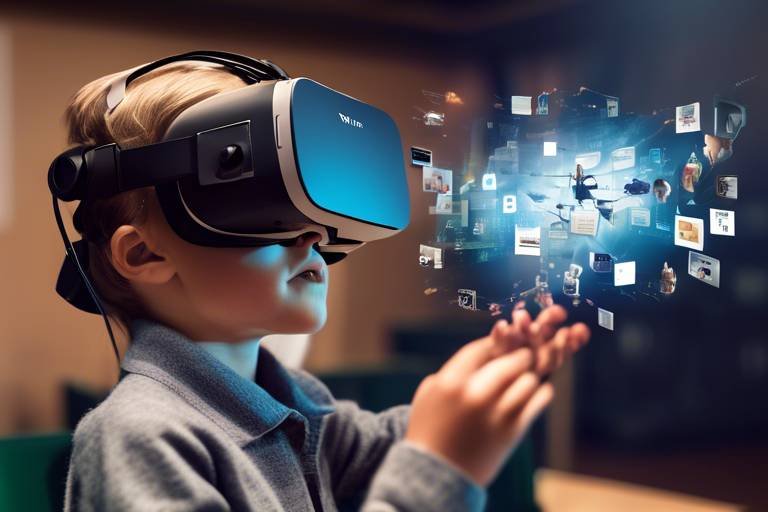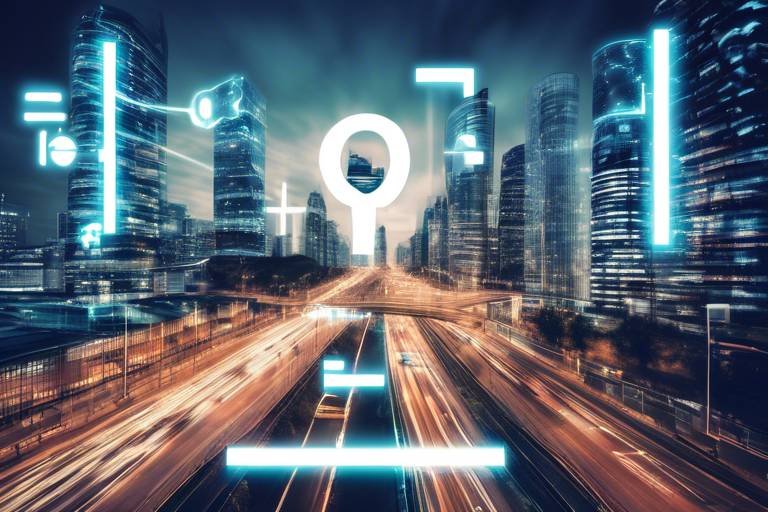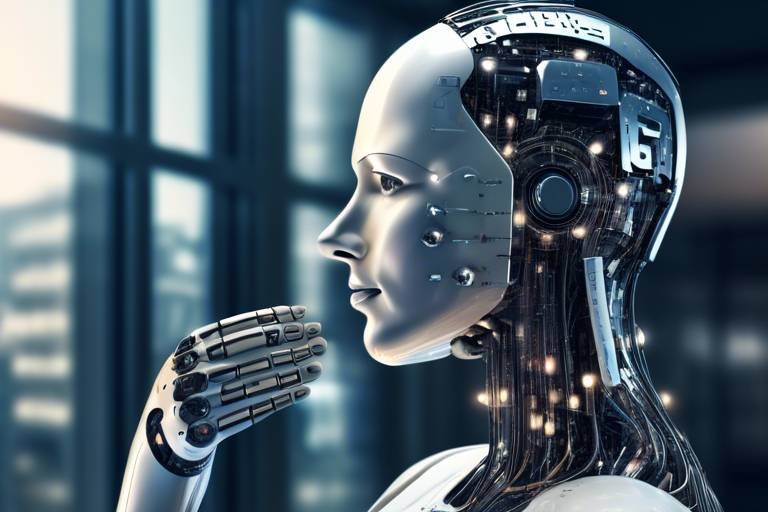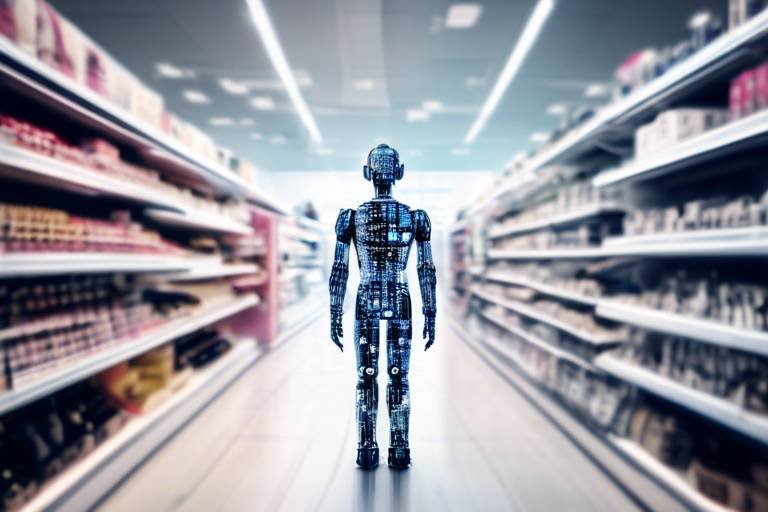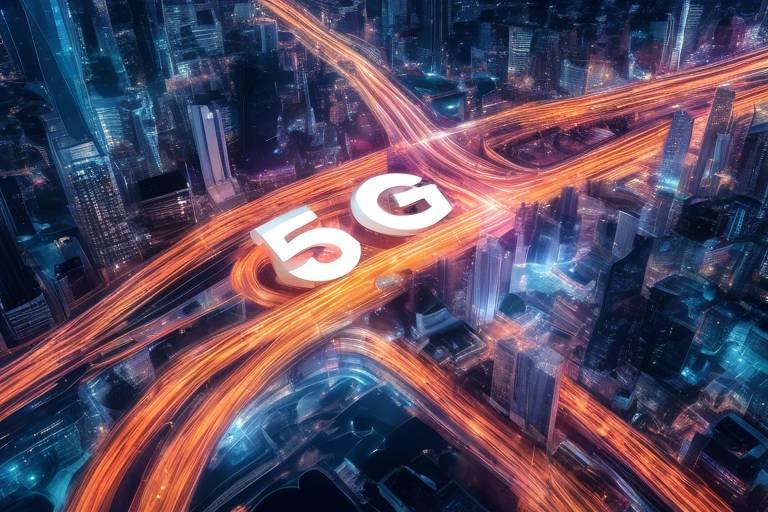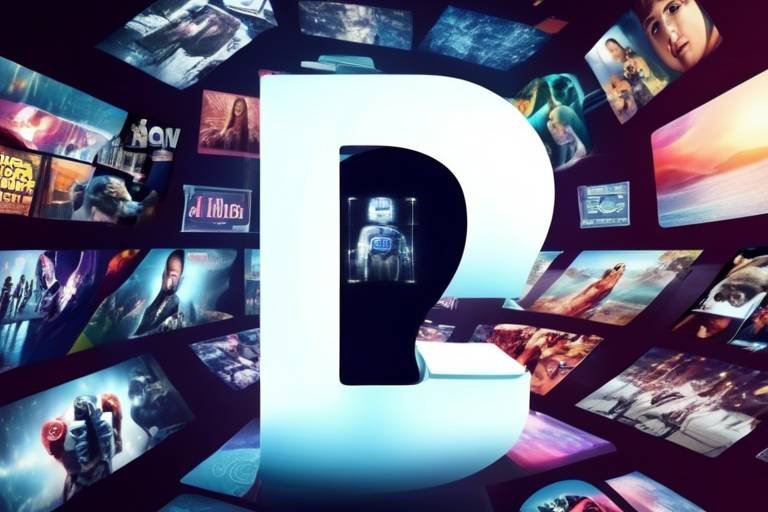Artificial Intelligence: Powering the Future of Online Dating?
In today's fast-paced digital world, the quest for love has taken a significant turn. Gone are the days when people relied solely on chance encounters or blind dates arranged by friends. Instead, artificial intelligence (AI) has stepped into the spotlight, transforming the way we connect, communicate, and ultimately find our soulmates. Imagine a world where algorithms sift through mountains of data to find that perfect match for you—sounds like science fiction, right? Well, it's not! AI is revolutionizing online dating, making it more efficient, personalized, and, dare we say, enjoyable.
But how exactly is AI powering this new era of romance? The answer lies in the sophisticated algorithms that underpin modern dating platforms. These algorithms are designed to analyze vast amounts of user data, from preferences and interests to past interactions, helping to create a more accurate picture of what each individual is looking for in a partner. It's like having a personal matchmaker who knows you better than you know yourself!
Furthermore, the integration of AI into online dating isn't just about finding matches. It's also about enhancing user experiences. Picture this: you're scrolling through profiles, and instead of the usual endless swiping, you receive curated suggestions that align with your interests and values. This level of personalization is not only refreshing but also increases the chances of meaningful connections. AI takes into account your likes, dislikes, and even your behavioral patterns to fine-tune its recommendations, making your dating journey more enjoyable and less frustrating.
However, as with any technological advancement, the rise of AI in online dating comes with its own set of challenges and ethical considerations. Users often wonder about the safety of their personal information and how it is being used. After all, when you share your heart with a dating app, you want to ensure that your data is secure and not falling into the wrong hands. Additionally, concerns about bias in AI algorithms can lead to skewed matchmaking outcomes, raising questions about fairness and inclusivity in the dating landscape.
As we look ahead, the future of AI in online dating seems bright yet complex. Innovations are continually emerging, promising to further enhance our romantic experiences. From virtual reality dates to AI-driven conversation starters, the possibilities are endless. But amidst this excitement, it's crucial for both users and developers to remain vigilant about privacy concerns and the ethical implications of using AI in such personal aspects of our lives.
In conclusion, AI is undeniably reshaping the future of online dating, making it more tailored, efficient, and user-friendly. As we embrace these changes, it's essential to strike a balance between technological advancements and ethical responsibility. The journey of finding love may be evolving, but at its core, it remains a deeply human experience.
- How does AI improve matchmaking in dating apps? AI analyzes user data and preferences to suggest more compatible matches, enhancing the overall dating experience.
- Are my personal data safe with AI-driven dating platforms? While many platforms prioritize data security, users should always review privacy policies and take precautions to protect their information.
- Can AI algorithms be biased? Yes, if not properly designed, AI algorithms can reflect biases present in their training data, potentially leading to unfair matchmaking experiences.
- What does the future hold for AI in online dating? Emerging trends include more personalized experiences, virtual reality dates, and advanced conversation starters powered by AI.

The Evolution of Online Dating
Online dating has come a long way since its inception in the early days of the internet. Initially, it was a simple concept: people would create profiles on basic websites, listing their interests and preferences in the hope of finding a match. It was like throwing a message in a bottle into a vast ocean, hoping someone would respond. Fast forward to today, and we see a landscape transformed by technology, where sophisticated algorithms and artificial intelligence (AI) play crucial roles in connecting people.
In the early 1990s, the first dating sites emerged, such as Match.com, which allowed users to browse profiles and send messages. This marked the beginning of a new era in romantic connections. Users were excited, but the experience was often hit-or-miss, as compatibility was largely based on superficial information. As time progressed, the industry began to incorporate more advanced features, including chat rooms and forums, allowing users to interact more deeply before deciding to meet in person.
By the early 2000s, the introduction of mobile technology revolutionized online dating once again. Suddenly, dating apps like Tinder and Bumble emerged, allowing users to swipe through potential matches with just a flick of their finger. This gamification of dating made the process more engaging and accessible, appealing to a younger demographic that craved instant gratification. However, despite the fun, many users still faced challenges in finding meaningful connections.
As we moved into the 2010s, the integration of AI started to take shape. Dating platforms began to utilize algorithms that analyzed user data to enhance matchmaking. Imagine having a personal assistant who knows your preferences, dislikes, and even your dating history, all while suggesting the best matches based on this information. This was a game-changer, as AI began to refine the process of finding compatible partners.
Today, we are witnessing a fusion of technology and romance that was once the stuff of science fiction. Platforms are now employing machine learning techniques to improve user experiences continuously. For instance, AI can analyze user interactions and preferences, adjusting its recommendations in real-time. It's like having a dating coach who learns your style and helps you navigate the complex world of online relationships.
In summary, the evolution of online dating reflects broader technological advancements and changing social norms. From the early days of simple profiles to the current AI-driven matchmaking systems, the landscape has been reshaped significantly. As we look ahead, it’s clear that online dating will continue to evolve, driven by the relentless march of innovation and the human desire for connection.

AI Algorithms in Matchmaking
In the ever-evolving world of online dating, artificial intelligence algorithms have emerged as the secret sauce behind successful matchmaking. Gone are the days of simplistic profiles and basic search filters; today, dating apps harness the power of sophisticated algorithms to analyze user data and deliver matches that are not just random but are tailored to individual preferences. It's like having a personal matchmaker who knows you better than you know yourself!
At the heart of these AI algorithms lies a complex web of data analysis, where every swipe, like, and message contributes to a deeper understanding of user behavior. These algorithms sift through mountains of data to identify patterns and preferences, ensuring that users are presented with potential matches that resonate with their unique desires. Imagine walking into a café where the barista already knows your favorite drink—this is the level of personalization that AI brings to online dating!
Understanding user preferences is crucial for effective matchmaking. Dating platforms employ various methods to collect and analyze data, which informs their AI-driven matchmaking processes. This includes:
- User Profiles: Comprehensive profiles that go beyond basic information, incorporating interests, values, and relationship goals.
- Behavior Tracking: Monitoring user interactions on the platform, such as likes, messages, and time spent on profiles.
- Feedback Mechanisms: Encouraging users to provide feedback on matches to refine algorithms continuously.
By leveraging this data, AI algorithms can identify what makes a successful match, allowing them to predict compatibility with remarkable accuracy. It's almost like having a crystal ball that reveals who you might click with before you even meet!
User profiles and behavior tracking play a vital role in refining matchmaking algorithms. Every interaction on a dating app contributes to a larger picture of what a user is looking for. For instance, if a user frequently swipes right on profiles with certain traits—like a love for hiking or a preference for dogs—these details are noted and factored into future match suggestions.
This continuous feedback loop not only enhances the accuracy of matches but also creates a more engaging user experience. Users feel seen and understood, which can significantly increase their satisfaction with the platform. Think of it as a dating app that evolves with you, learning your preferences and adapting to your changing desires.
Predictive analytics takes matchmaking to the next level by anticipating user preferences and behaviors. By analyzing historical data, AI can forecast potential matches that a user is likely to be interested in, even before they realize it themselves. This is where the magic happens—AI algorithms can suggest profiles that align with a user’s evolving tastes, making the online dating experience feel almost intuitive.
Imagine going to a restaurant where the chef knows your favorite dish before you even sit down; that's the kind of seamless experience AI aims to create in online dating. With predictive analytics, users are not just passive participants; they become active explorers of their romantic possibilities, discovering connections they might not have considered otherwise.
In conclusion, AI algorithms in matchmaking are revolutionizing the way we connect in the digital age. By harnessing the power of data collection, behavior tracking, and predictive analytics, these algorithms are creating a more personalized and satisfying dating experience. As technology continues to advance, we can only expect the matchmaking process to become even more refined, making love in the digital age a thrilling adventure.
- How do AI algorithms improve matchmaking? AI algorithms analyze user data to identify patterns and preferences, allowing for more compatible matches.
- What kind of data do dating apps collect? Dating apps collect data from user profiles, interactions, and feedback to enhance their algorithms.
- Are there privacy concerns with AI in dating? Yes, privacy concerns exist, especially regarding data collection and user information security.

Data Collection and Analysis
In the world of online dating, data collection and analysis are the backbone of creating successful matches. Imagine walking into a crowded room full of potential partners, but instead of guessing who might be a good fit, you have a personal assistant equipped with a wealth of information and insights about everyone present. This is essentially what AI does for dating platforms. By collecting and analyzing vast amounts of data, these platforms can help users find their ideal matches with precision.
So, how does this process work? The journey begins when users create their profiles, providing essential information such as interests, preferences, and even personality traits. But that’s just the tip of the iceberg. Dating apps go beyond basic profile data by employing various techniques to gather insights about user behavior. For instance, they monitor how users interact with the app: which profiles they like, whom they message, and even how long they spend looking at particular profiles. This behavioral data is invaluable, as it helps the algorithms understand what users are genuinely looking for in a partner.
Moreover, many dating platforms utilize machine learning techniques to refine their algorithms continually. By analyzing historical data, these algorithms can identify patterns and trends that indicate compatibility. For example, if a user tends to engage more with profiles that share similar hobbies or values, the AI can prioritize showing them matches that reflect those preferences. This not only increases the chances of successful connections but also enhances user satisfaction by making the experience feel more personalized.
Here's a quick overview of the data collection methods commonly used in online dating:
- Profile Information: Basic details such as age, gender, location, and interests.
- User Interactions: Tracking likes, messages, and time spent on profiles.
- Feedback Mechanisms: Allowing users to rate their matches or provide feedback on their experiences.
- External Data Sources: Integrating information from social media or other platforms to enrich user profiles.
However, it’s essential to recognize that while data collection enhances matchmaking, it also raises questions about privacy and security. Users must trust that their information is handled responsibly and ethically. Dating platforms are tasked with implementing robust security measures to protect user data from breaches and misuse. Transparency about how data is used and ensuring that users can control their information are critical factors in building this trust.
In summary, data collection and analysis are pivotal to the success of AI-driven matchmaking in online dating. By leveraging user data effectively, dating platforms can create a more engaging and tailored experience, ultimately leading to better matches and happier users. As technology continues to evolve, the sophistication of these algorithms will only improve, making the search for love in the digital age more exciting and efficient.

User Profiles and Behavior Tracking
In the world of online dating, user profiles and behavior tracking are not just buzzwords; they are the backbone of effective matchmaking. Imagine walking into a bar where the bartender knows your favorite drink, your music preferences, and even the type of people you usually vibe with. That's the power of AI in online dating. By creating detailed user profiles, dating apps can gather a wealth of information that goes beyond just basic demographics. These profiles often include interests, hobbies, and even relationship goals, giving the algorithms a rich tapestry of data to work with.
Behavior tracking takes this a step further. Every swipe, message, and interaction contributes to a user's digital footprint. This data is invaluable for refining matchmaking algorithms. For example, if a user frequently swipes right on profiles with specific traits, the algorithm learns to prioritize similar profiles in the future. It's like having a personal assistant who learns your preferences over time, making your dating experience smoother and more enjoyable.
Moreover, the information gathered from user interactions can be categorized into different segments. Here’s a quick breakdown of how behavior tracking can enhance matchmaking:
- Engagement Patterns: Analyzing how often users engage with certain types of profiles can reveal their true preferences.
- Response Rates: Tracking how quickly users respond to messages can help gauge their interest levels.
- Content Interaction: Monitoring which profiles users spend the most time viewing can provide insights into what they find appealing.
But it’s not just about collecting data; it’s about using it wisely. Dating platforms are increasingly investing in machine learning techniques to analyze this data effectively. These algorithms can identify patterns that might not be immediately obvious to human matchmakers. For instance, they can uncover hidden preferences that a user might not even be consciously aware of. This leads to more meaningful connections and ultimately, a higher success rate in finding compatible partners.
However, with great power comes great responsibility. As these platforms gather more data, they must also ensure that they are transparent about how this information is used. Users should feel confident that their data is being handled ethically and securely. This is where the challenge lies: balancing the need for personalized experiences with the imperative of protecting user privacy.
In conclusion, user profiles and behavior tracking are revolutionizing the online dating landscape. By harnessing the power of AI, dating apps can create a more tailored experience that not only meets user expectations but exceeds them. As we move forward, it will be fascinating to see how these technologies evolve and continue to shape the way we connect with others in the digital age.
- How does AI improve matchmaking in dating apps? AI analyzes user data to identify patterns and preferences, leading to more compatible matches.
- What kind of data do dating apps collect from users? Apps typically collect information on interests, demographics, and user interactions like swipes and messages.
- Are my personal details safe on dating platforms? Reputable dating apps implement strong security measures to protect user data, but it's always wise to review their privacy policies.
- Can AI algorithms be biased? Yes, bias can occur if the data used to train algorithms reflects societal biases, which is why ongoing evaluation is crucial.

Predictive Analytics in Dating
In the fast-paced world of online dating, predictive analytics has emerged as a game-changer, transforming the way users interact with dating platforms. Imagine walking into a bar where the bartender knows your favorite drink before you even order it. That's the power of predictive analytics in dating! By leveraging vast amounts of data, dating apps can anticipate your preferences and behaviors, making the matchmaking process not just efficient but also incredibly tailored to individual users.
At its core, predictive analytics involves analyzing historical data to identify patterns and trends. In the context of online dating, this might mean looking at your past interactions, the profiles you liked, and even the messages you sent. By crunching these numbers, algorithms can create a profile of what you’re looking for in a partner. For instance, if you often swipe right on profiles with a shared interest in hiking, the app will prioritize showing you users who also enjoy the great outdoors. It’s like having a personal matchmaker who knows you better than you know yourself!
Moreover, the algorithms don’t just stop at identifying potential matches. They also predict how likely you are to engage with a particular profile based on your past behavior. This means that the more you use the app, the better it gets at presenting options that resonate with you. Think of it as a dating coach that learns from every date you go on, refining its advice and suggestions with each experience. The result? A more satisfying dating experience that keeps users coming back for more.
However, predictive analytics isn't without its challenges. While it can enhance user satisfaction, it also raises questions about privacy and data security. Users may wonder how their data is being used and whether their preferences are being shared with third parties. To address these concerns, many dating platforms are investing in robust data protection measures, ensuring that user information remains confidential while still benefiting from the insights predictive analytics provides.
In summary, predictive analytics in dating is not just about finding a match; it’s about creating a personalized journey that enhances user engagement and satisfaction. As technology continues to evolve, we can expect even more sophisticated algorithms that will revolutionize our approach to finding love in the digital age.
- What is predictive analytics in online dating? Predictive analytics refers to the use of historical data to forecast user preferences and behaviors, helping dating apps provide more relevant matches.
- How does predictive analytics improve user experience? By analyzing past interactions, dating apps can tailor recommendations and enhance the likelihood of successful matches.
- Are my personal data safe with dating apps using predictive analytics? Reputable dating platforms implement strong data protection measures to ensure user privacy while utilizing analytics.
- Can predictive analytics eliminate biases in matchmaking? While predictive analytics can enhance match relevance, it is essential to address underlying biases in the algorithms themselves to ensure fairness.

Personalization in Online Dating
When it comes to online dating, personalization is the secret sauce that transforms a mundane experience into something truly engaging and meaningful. Imagine stepping into a virtual world where every match feels tailor-made just for you. Sounds dreamy, right? Well, that’s exactly what AI is making possible in the realm of romance. By leveraging advanced algorithms, dating platforms can analyze a plethora of data points—from your profile details to your swiping habits—to create a uniquely personalized experience.
At the heart of this personalization is the understanding that no two users are the same. Each individual brings their own preferences, quirks, and desires to the table. Through the use of AI, dating apps can sift through mountains of information to identify patterns and preferences that might not be immediately obvious. For instance, if you consistently swipe right on profiles with a particular interest, the algorithm takes note and starts suggesting similar matches. It’s like having a personal matchmaker who knows exactly what you’re looking for!
Moreover, personalization doesn’t just stop at matching. It extends into the user experience itself. For example, many platforms now offer personalized prompts and conversation starters based on your interests. This means that when you do get matched, you can dive right into discussions that matter to you, rather than awkwardly fumbling for topics. The result? A more fluid and enjoyable interaction that has the potential to blossom into something more.
But personalization isn’t just about making matches; it’s also about creating a safe and comfortable environment for users. AI can help tailor the content you see, filtering out profiles that don’t align with your preferences or values. This level of control allows users to navigate the dating landscape with more confidence, knowing that their experience is curated to fit their unique needs.
However, it’s important to note that while personalization enhances user engagement, it also requires a careful balance. The more data dating apps collect, the greater the responsibility they have to protect user privacy. Users must feel secure that their information is being used ethically and transparently. After all, nobody wants their personal preferences to be a topic of discussion in the wrong circles!
In conclusion, the future of online dating is undoubtedly intertwined with the concept of personalization. As AI continues to evolve, we can expect even more sophisticated methods of tailoring experiences that not only enhance compatibility but also foster genuine connections. So, the next time you log into your favorite dating app, take a moment to appreciate the intricate web of technology working behind the scenes to make your romantic journey a little more special.
- How does AI improve matchmaking? AI analyzes user data to identify patterns and preferences, allowing for more compatible matches.
- Is my personal information safe on dating apps? Most reputable dating platforms implement strict data privacy measures, but it's essential to review their policies.
- Can personalization lead to bias in matchmaking? Yes, if not carefully managed, personalization algorithms can inadvertently reinforce biases.
- What role does user feedback play in personalization? User feedback is crucial as it helps refine algorithms and improves the overall matchmaking process.

Challenges and Ethical Considerations
As we dive deeper into the world of online dating powered by artificial intelligence, it’s essential to address the challenges and ethical considerations that accompany this technological revolution. While AI brings remarkable advancements in matchmaking and user experience, it also introduces a myriad of concerns that can’t be overlooked. For instance, the very essence of personal connections is at stake when algorithms dictate compatibility. Are we risking genuine human interaction for the sake of efficiency?
One of the most pressing issues is privacy concerns. Dating apps often require users to share a wealth of personal information, from basic demographics to intricate details about preferences and behaviors. The data collected is then utilized to create personalized experiences, but at what cost? Users may not fully comprehend how their data is being used or the potential for it to be shared with third parties. This lack of transparency can lead to a feeling of vulnerability and distrust among users. For dating platforms, finding a balance between personalizing experiences and respecting user privacy is crucial.
Moreover, the implications of data collection extend beyond privacy. There’s a significant risk of data breaches, where sensitive user information could fall into the wrong hands. Imagine the ramifications if someone’s intimate conversations or personal details were leaked. This scenario raises important questions about how dating platforms can safeguard user information effectively. Implementing robust security measures and transparent data handling practices is paramount to maintaining user trust.
Another critical concern is the bias embedded in AI algorithms. Algorithms are designed based on historical data, which can inadvertently perpetuate existing biases. For example, if a dating app primarily caters to a specific demographic, it may unintentionally exclude or misrepresent other groups. This can lead to a homogeneous dating pool, where diversity and inclusivity are compromised. The challenge lies in ensuring that AI systems are trained on diverse datasets that reflect the wide array of human experiences and identities.
To combat these biases, dating platforms need to actively work towards creating algorithms that promote fairness and inclusivity. This could involve regular audits of their algorithms to identify and rectify any discriminatory patterns. Additionally, platforms should consider implementing user feedback mechanisms that allow individuals to report biases they encounter, fostering a more equitable dating environment.
As we look toward the future, the ethical implications of AI in online dating must be carefully navigated. It’s not just about matching users; it’s about creating a space where individuals feel safe, respected, and valued. The responsibility lies with developers, policymakers, and users alike to advocate for ethical practices in AI-driven platforms. By prioritizing privacy, security, and inclusivity, we can ensure that technology enhances, rather than detracts from, the human experience of dating.
- What are the main privacy concerns regarding AI in online dating?
Privacy concerns primarily revolve around how personal data is collected, stored, and used by dating platforms. Users often worry about data breaches and the potential misuse of their information.
- How can dating platforms ensure their AI algorithms are unbiased?
Platforms can ensure unbiased algorithms by using diverse training datasets, conducting regular bias audits, and incorporating user feedback to improve their systems.
- What steps can users take to protect their privacy on dating apps?
Users can protect their privacy by being cautious about the information they share, reviewing privacy settings, and choosing platforms that prioritize data security.

Privacy Concerns in AI-Driven Platforms
In the realm of online dating, where love and connection are just a click away, privacy concerns loom large, especially with the integration of artificial intelligence. As dating apps increasingly rely on AI to enhance user experiences, the question arises: how safe is our personal information? With algorithms analyzing everything from our preferences to our interactions, the potential for data misuse is a real and pressing issue.
Imagine sharing your deepest secrets with someone you just met at a coffee shop. Now, think about how that scenario translates into the digital world. When users sign up for dating platforms, they often provide a wealth of personal information, including their location, interests, and even relationship history. This information is gold for AI algorithms, which use it to create tailored experiences. However, this very data can be vulnerable to breaches and unauthorized access.
To illustrate, here are some key privacy concerns that users should be aware of:
- Data Collection: Many dating apps collect extensive data, often beyond what users realize. This can include tracking user behavior, interactions, and even location data.
- Data Sharing: Users may not be fully aware of how their data is shared with third parties, which can lead to unexpected privacy violations.
- Security Risks: Cybersecurity threats are ever-present. A breach in a dating platform can expose sensitive user information, leading to identity theft or harassment.
Moreover, the challenge of maintaining user privacy is compounded by the rapid evolution of technology. As AI becomes more sophisticated, the methods of data analysis and storage are also advancing. This means that even if a platform implements robust security measures today, these may not be sufficient in the future. Therefore, it’s crucial for dating apps to continuously update their security protocols and inform users about how their data is being used.
In response to these concerns, many platforms are beginning to adopt more transparent practices. For instance, some apps now provide users with clear privacy policies and options to control their data. This includes the ability to delete accounts, manage visibility settings, and even opt-out of certain data collection practices. Empowering users with knowledge and control over their information is a step in the right direction.
Ultimately, as we navigate the world of AI-driven dating platforms, it’s essential for users to remain vigilant. Understanding the implications of sharing personal information online is crucial. Just as you wouldn’t share your house keys with a stranger, being cautious about your data in the digital dating world is equally important. By staying informed and advocating for privacy rights, users can enjoy the benefits of AI in online dating while safeguarding their personal information.

Bias in AI Algorithms
Bias in AI algorithms can significantly impact the online dating experience, leading to unfair matchmaking outcomes and potentially alienating users. But what exactly does bias mean in this context? Essentially, it refers to the systematic favoritism or prejudice that can occur when algorithms make decisions based on skewed data. Imagine a dating app that predominantly shows profiles of users from a specific demographic while sidelining others. This not only limits the diversity of matches but also reinforces societal stereotypes.
One of the primary sources of bias in AI algorithms is the data used to train them. If the historical data reflects societal biases—such as gender roles, racial preferences, or socio-economic status—the AI will likely perpetuate these biases in its recommendations. For instance, if an algorithm is trained on data that shows a preference for certain ethnicities, it may inadvertently favor those profiles over others, leading to a lack of representation and inclusivity in matches.
Moreover, the design of the algorithms themselves can introduce bias. Developers may unconsciously embed their own biases into the coding process, which can affect how the AI interprets user preferences and behavior. This can lead to a narrow understanding of compatibility, where the algorithm might prioritize superficial traits over deeper emotional connections.
To illustrate the impact of bias in AI algorithms, consider the following table that outlines different types of biases that can manifest in online dating platforms:
| Type of Bias | Description | Potential Impact |
|---|---|---|
| Sampling Bias | Occurs when the data used to train the algorithm does not represent the entire user base. | Leads to skewed match recommendations and excludes diverse user profiles. |
| Confirmation Bias | The algorithm favors data that confirms existing stereotypes or preferences. | Reinforces societal norms and limits user exposure to different backgrounds. |
| Algorithmic Bias | Bias introduced through the algorithm's design and decision-making process. | Results in unfair treatment of certain user groups and can diminish user trust. |
Addressing these biases is crucial for creating a more equitable online dating environment. Developers and researchers are increasingly recognizing the importance of implementing ethical guidelines and diverse data sets to mitigate bias. By ensuring that AI algorithms are trained on a wide range of user experiences and preferences, dating platforms can foster a more inclusive atmosphere where everyone has a fair chance at finding love.
In conclusion, while AI has the potential to revolutionize online dating, it is imperative to remain vigilant about the biases that can infiltrate these systems. By prioritizing fairness and inclusivity, dating services can harness the full power of AI without compromising the diverse tapestry of human connections.
- What is bias in AI algorithms? Bias in AI algorithms refers to systematic favoritism or prejudice that can occur when algorithms make decisions based on skewed data.
- How does bias affect online dating? Bias can lead to unfair matchmaking experiences, limiting user diversity and reinforcing societal stereotypes.
- What can be done to mitigate bias in dating algorithms? Implementing ethical guidelines, using diverse data sets, and continuously monitoring AI performance can help reduce bias.
- Why is diversity important in online dating? Diversity ensures that all users feel represented and valued, enhancing the overall user experience and fostering genuine connections.

The Future of AI in Online Dating
The future of online dating is poised for an exciting transformation, driven by the rapid advancements in artificial intelligence. As technology continues to evolve, we can expect dating platforms to become even more intuitive, responsive, and personalized. Imagine a world where your dating app knows your preferences so well that it can suggest the perfect match before you even realize you’re looking for someone. Sounds like something out of a sci-fi movie, right? But it's closer than you think!
One of the most thrilling prospects is the integration of machine learning algorithms that not only analyze your past interactions but also learn from them. These algorithms will adapt to your changing preferences over time, ensuring that the matches you receive are not just based on static data but on a dynamic understanding of who you are and what you seek in a partner. This level of personalization could lead to higher satisfaction rates among users, as they find connections that resonate on a deeper level.
Furthermore, the use of natural language processing (NLP) is set to revolutionize communication within dating apps. With NLP, AI will be able to analyze the language used in messages, providing insights into emotional tones and compatibility. Imagine a scenario where your app not only suggests potential matches but also recommends conversation starters based on shared interests and emotional compatibility. This could significantly reduce the awkwardness of initial interactions, making the process of getting to know someone more enjoyable.
In addition to enhancing user experience, AI is likely to play a critical role in ensuring user safety. Advanced algorithms can help detect fraudulent profiles and inappropriate behavior, creating a safer environment for users. By analyzing patterns of behavior, AI can flag suspicious activity and alert users, allowing them to navigate the dating landscape with greater confidence. This focus on safety is paramount, especially as online dating continues to gain popularity among younger generations.
Moreover, we may see the emergence of virtual reality (VR) and augmented reality (AR) features in dating apps. Picture this: a virtual date in a cozy café, where you can interact with your match in a simulated environment. This could add a whole new dimension to online dating, making it feel more real and engaging. As technology continues to blur the lines between the virtual and physical worlds, the possibilities for creating meaningful connections are endless.
However, with all these advancements, we must remain vigilant about the ethical implications of AI in dating. The balance between personalization and privacy is delicate. Users must feel secure that their data is being handled responsibly. Transparency in how data is collected and used will be crucial in building trust with users. Dating platforms will need to establish clear guidelines and practices to protect user information while still benefiting from AI's capabilities.
As we look ahead, it’s clear that AI will not only enhance the matchmaking process but also redefine what it means to connect with others in the digital age. The future of online dating is bright, filled with innovations that promise to create more meaningful relationships. So, whether you're a hopeless romantic or a skeptic, one thing is for sure: the journey to finding love is about to get a serious upgrade!
- How will AI improve my online dating experience?
AI will analyze your preferences and behaviors to suggest more compatible matches, enhancing the overall experience. - What role does privacy play in AI-driven dating apps?
Privacy is crucial; users need to trust that their data is secure while benefiting from personalized experiences. - Can AI help prevent catfishing?
Yes, AI can detect patterns of behavior associated with fraudulent profiles, helping to create a safer dating environment. - Will virtual reality become a common feature in dating apps?
As technology advances, VR and AR features are likely to be integrated, offering immersive dating experiences.
Frequently Asked Questions
- How is AI transforming online dating?
AI is revolutionizing online dating by utilizing advanced algorithms to analyze user data, making matchmaking more efficient and personalized. This means that users can find more compatible matches, enhancing their overall experience.
- What role do algorithms play in matchmaking?
Algorithms are the backbone of modern matchmaking services. They assess user preferences, behaviors, and interactions to predict compatibility, ensuring that users are matched with individuals who share similar interests and values.
- How do dating apps collect user data?
Dating apps gather user data through profile information, user interactions, and behavior tracking. This data is then analyzed to refine matchmaking processes and improve user satisfaction.
- What is predictive analytics in dating?
Predictive analytics involves using historical data to forecast user preferences and behaviors. By analyzing past interactions, dating apps can anticipate what users might like, helping them find suitable matches more effectively.
- Are there privacy concerns with AI-driven dating platforms?
Yes, privacy is a significant concern. As dating apps collect extensive user data, it’s crucial for these platforms to implement robust security measures to protect user information and maintain trust.
- What are the ethical considerations of using AI in dating?
Ethical concerns include potential biases in algorithms and the implications of data collection. It’s essential for dating platforms to address these issues to ensure fairness and inclusivity in matchmaking.
- How can bias in AI algorithms affect users?
Bias in AI algorithms can lead to unfair matchmaking experiences, potentially excluding certain demographics or preferences. This can hinder diversity and inclusivity in online dating.
- What does the future hold for AI in online dating?
The future of AI in online dating looks promising, with advancements expected to enhance personalization, improve user experiences, and introduce innovative features that could further reshape the dating landscape.





